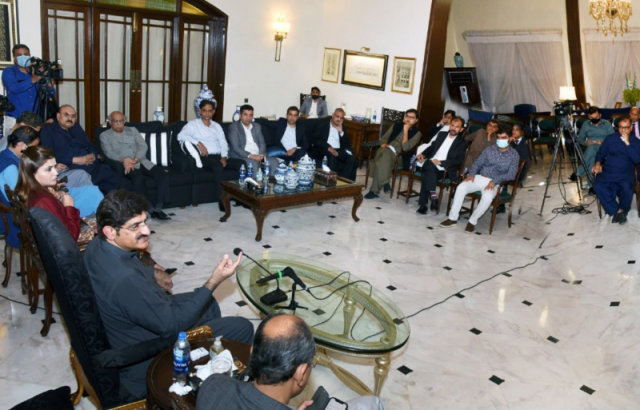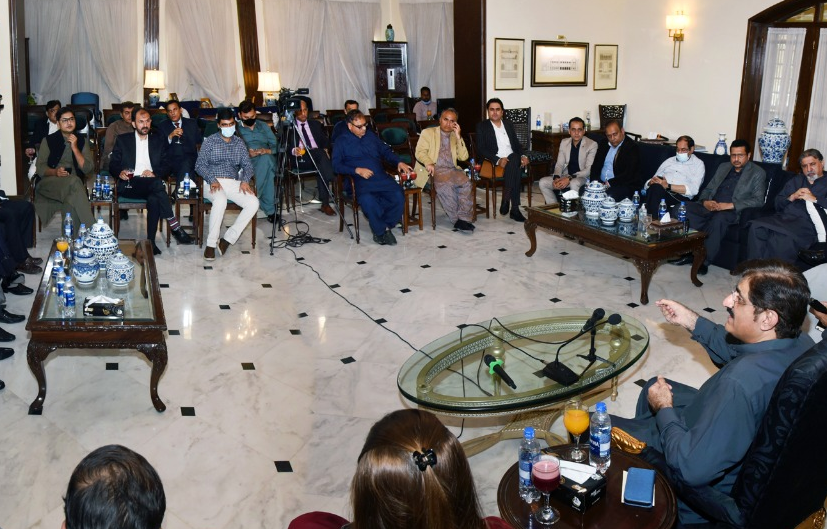Sindh deplores at source deduction of Rs31b by Centre
CM says action by FBR an attempt to cripple the provincial govt financially

The federal government, in violation of the Constitution of Pakistan and the Supreme Court’s decision, has deducted Rs31.9 billion out of Rs35 billion at source from a 15-day share of Sindh government and released only Rs3 billion which is an attempt to cripple the provincial government financially.
This was disclosed by Sindh Chief Minister Syed Murad Ali Shah in a meeting with the editors of newspapers and directors of news channels at the CM House in Karachi.

The chief minister briefed the senior media persons about the attitude of the federal government towards Sindh and sensitised them about issues such as at source deduction from Sindh government share, water and gas shortage, imposition of unilateral transfer, posting rotation policy.
He also discussed price hike, unemployment, economic crisis, curbs against media, strangulating voice of media persons by arresting them and various others social issues against which PPP Chairman Bilawal Bhutto Zardari has become a `loud voice’ by leading a long march from Karachi to Islamabad from February 27.
At Source dedication
Talking about at source deduction from the share of Sindh government, the chief minister said that the federal government had to transfer Rs35 billion [share of 15 days from February 1 to 15] but they deducted Rs32 billion and transferred only Rs3 billion which was aimed at crippling the provincial government financially.
The CM said that that a bilateral MoU was signed between Sindh Revenue Board (SRB) and the Federal Board of Revenue (FBR) on March 13, 2014 in connection with Cross Input tax Adjustment - meaning thereby the taxpayers would be allowed to adjust in their sales tax return, the input tax paid in the other jurisdiction.
He added such cross-adjustments were supposed to be scrutinised and reconciled and the net amount to be payable to the administration in whose return higher quantum of cross-adjustment was made. “This arrangement gave rise to some serious differences; therefore, another agreement was signed in August 2016 to implement the MOU.
Shah said that a joint committee as laid down in the MOU was also formed and series of meetings were also held. He added that as per the MOU, if an amount was disputed, it was agreed that the disputed and unreconciled amount would be referred to an Accounting Committee.
Shah said that in disregard of the laid down procedures, FBR on its own, determined a net amount of Rs31.978 billion, payable by SRB by rejecting SRB’s valid claim of Rs42.5 billion against different heads. “Not only that, on the basis of such unilateral working and in sheer violation of the articles of MoU and agreed parameters, the FBR with the approval of Federal Finance Minister has unilaterally slashed the share of Sindh province from National Finance Commission,” he said.
FBR’s biased and arbitrary move has created disharmony and distrust between the Centre and Sindh, which will affect the harmonisation process of taxation and number of allied steps being taken under the umbrella of national tax council and NFC, the CM said.
It is noteworthy that on similar account, the Federal government has dispensed with amount of approximately Rs40 billion Rupees to two PTI ruled provinces without any deductions, the chief minister lamented.
Water Accord of 1991
The CM said that under the 1991 Water Accord, the provinces have to share water surpluses as well as shortages in accordance with the formula agreed on, but during the ongoing shortages, rabi/kharif seasons, Sindh has been deprived of its due share.\
Shah said that in the 1991 accord, water distribution between the provinces was agreed upon a formula. “For every 10 days there is an allocation of water for every province and in case of shortage or surplus of water, water is shared as per the agreed-upon formula,” he said.
He said that under the accord, the Indus River System Authority was created to implement the agreement in true letter and spirit, but it has failed to do its job judiciously.
The CM said that CCI had assigned the task to then Attorney General Anwar Mansoor to study the grievances of Sindh and recommend legal position but the Prime Minister on the request of chief secretary of the Punjab did not approve the report.
Natural Gas
The chief minister, talking about natural gas said that the Constitution guaranteed that people of the province from where the gas was produced had first right to the resource, but the federal government has denied this right to the people of Sindh.
He added that recently, the Sui Southern Gas Company (SSGC) slashed gas supply to Sindh y 15 per cent Murad said the province has filed a legal suit against this deduction.
The CM said that his stand was very clear and candid that the gas deficient provinces should be given imported re-liquefied natural gas (RLNG) - why the PTI government was forcing Sindh to get RLNG by taking away its natural gas extracted from indigenous fields.
Census 2017
The chief minister said that the Council of Common Interest (CCI) was established in 1973 and since all the decision have been taken with consensus, except the recent decision on census against which he [Sindh government] had given a dissent note.
Murad said that that the controversial census of 2017 has shown 47.8 million population of the province whereas its population, as per UNICEF survey, stands at 61.04 million
The CM disclosed that in the Census 2017 declared Sindh having a total of 8,478,047 households with 5.64 persons per house, constituting a population of 47,854,510. He added that according to the Multiple Indicator Cluster Survey (MICS) undertaken by all the provincials’ governments in coordination with Unicef the average household for Sindh was 7.2 persons per household, he said and added based on that survey the total population of the province would come to 61,041,938 as opposed to 47,854,510 in Census 2017.” There were similar disparities regarding the population figures of other provinces as well, he said.
Murad deplored that he had sent a reference to the speaker of national Assembly to discuss the matter in the joint session of the parliament, but it was denied.
Long March
The chief minister told the media representatives that PPP Chairman Bilawal Bhutto Zardari has become voice of the poor people of Pakistan. He was leading a long march against Economic Failure of the federal government which has deprive [poor] people of square meals.
Shah said that on February 27 Bilawal Bhutto Zaradi would lead a long march to highlight the issue of poor people. He added that his party would share the route of the march with media.
Rotation policy
The chief minister said that the federal government has imposed unilateral transfer/posting rotation policy of the federal government officers working in the province. He added that under the policy they have transferred officers from Sindh and forcing them to relinquish the charge and join their new place of posting. Under the law the officers could not relinquish the charge until and unless the provincial government did not relieve them of their duties.
The CM said that his government was already facing shortage of officers and if the officers posted here [in Sindh] were relieved there would be a crisis-like situation in the provincial administration. Therefore, he had not relieved the officers, therefore the federal government has started retiring them forcibly.



















COMMENTS
Comments are moderated and generally will be posted if they are on-topic and not abusive.
For more information, please see our Comments FAQ